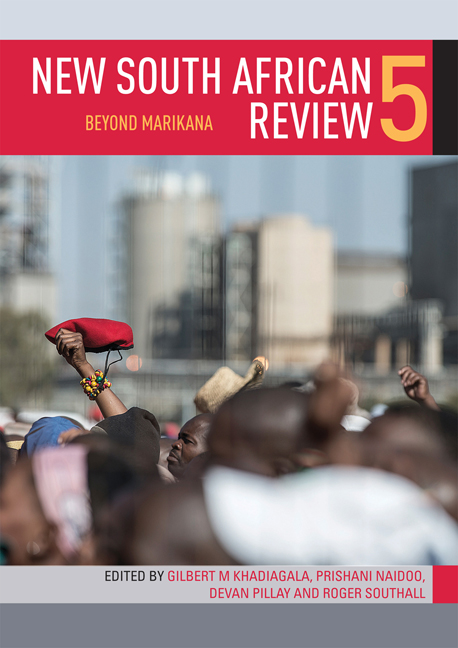Book contents
- Frontmatter
- Contents
- Preface
- Introduction: Political reconfigurations in the wake of Marikana
- PART 1 NEW POLITICAL DIRECTIONS?
- PART 2 ECONOMY, ECOLOGY AND LABOUR
- Introduction to Part 2
- Chapter 4 The South African economy: The minerals-energy-finance complex redubbed?
- Chapter 5 Between a rock and a hard place: State-business relations in the mining sector
- Chapter 6 The platinum belt strike wave: Breakdown in the institutionalisation of industrial conflict
- Chapter 7 When gold mining ends: An environmental catastrophe for Johannesburg?
- PART 3 STATE AND SOCIETY
- PART 4 SOUTH AFRICA IN THE INTERNATIONAL ARENA
- Contributors
- Index
Chapter 6 - The platinum belt strike wave: Breakdown in the institutionalisation of industrial conflict
from PART 2 - ECONOMY, ECOLOGY AND LABOUR
Published online by Cambridge University Press: 21 April 2018
- Frontmatter
- Contents
- Preface
- Introduction: Political reconfigurations in the wake of Marikana
- PART 1 NEW POLITICAL DIRECTIONS?
- PART 2 ECONOMY, ECOLOGY AND LABOUR
- Introduction to Part 2
- Chapter 4 The South African economy: The minerals-energy-finance complex redubbed?
- Chapter 5 Between a rock and a hard place: State-business relations in the mining sector
- Chapter 6 The platinum belt strike wave: Breakdown in the institutionalisation of industrial conflict
- Chapter 7 When gold mining ends: An environmental catastrophe for Johannesburg?
- PART 3 STATE AND SOCIETY
- PART 4 SOUTH AFRICA IN THE INTERNATIONAL ARENA
- Contributors
- Index
Summary
In 2012-2013, South Africa experienced an unprecedented strike wave in the platinum belt. The first strike started at Impala Platinum (Implats) in January 2012. It spread to other sectors and culminated in what became the Marikana massacre in which thirty-four workers were killed by the police and at least fifty lives were lost in various forms of violence. The strikes were characterised by hitherto unknown levels of worker militancy and the presentation of demands direct to management; by the rejection of the National Union of Mineworkers (NUM) (which at the time was the majority and recognised union in the sector); by the organisation of dissent by workers in informal structures independent of trade unions; by the use of muti and sangomas and various genres and similar repertoires of violence.
The wave of strikes is significant for a number of reasons. It represents one of the many different forms of social protest that characterise the South African democratic dispensation, and it took place in the platinum sector, which has surpassed gold in recent years to become the biggest mining sector in the country. Although mining has generally been declining in recent years in terms of its contribution to GDP and employment, it nevertheless remains crucial to shaping the South African socioeconomic order since the democratic transition. Its role in the mineral-energy complex is central to the South African economy, and understanding this is important in unpacking the post-apartheid socioeconomic and political order.
The strike wave presented one of the biggest challenges to the post-apartheid industrial relations order underpinned by the institutionalisation of industrial conflict, which is part of the post-apartheid social pact. It has so far been the most significant organisation of dissent, and of refusal, by the shop-floor workers outside the dominant trade unions aligned to the ruling African National Congress (ANC), to play within the established rules. This wave of strikes is thus significant, not only for understanding postapartheid industrial relations, but also for comprehending the general social order.
The strike wave raised pertinent questions about the (post-democratic transition) integrity of the South African industrial relations order (often viewed as an international model), which is anchored in the institutionalisation of industrial conflict and promotes collective bargaining and strong institutions such as trade unions to function as its instruments.
- Type
- Chapter
- Information
- New South African Review 5Beyond Marikana, pp. 104 - 119Publisher: Wits University PressPrint publication year: 2015



